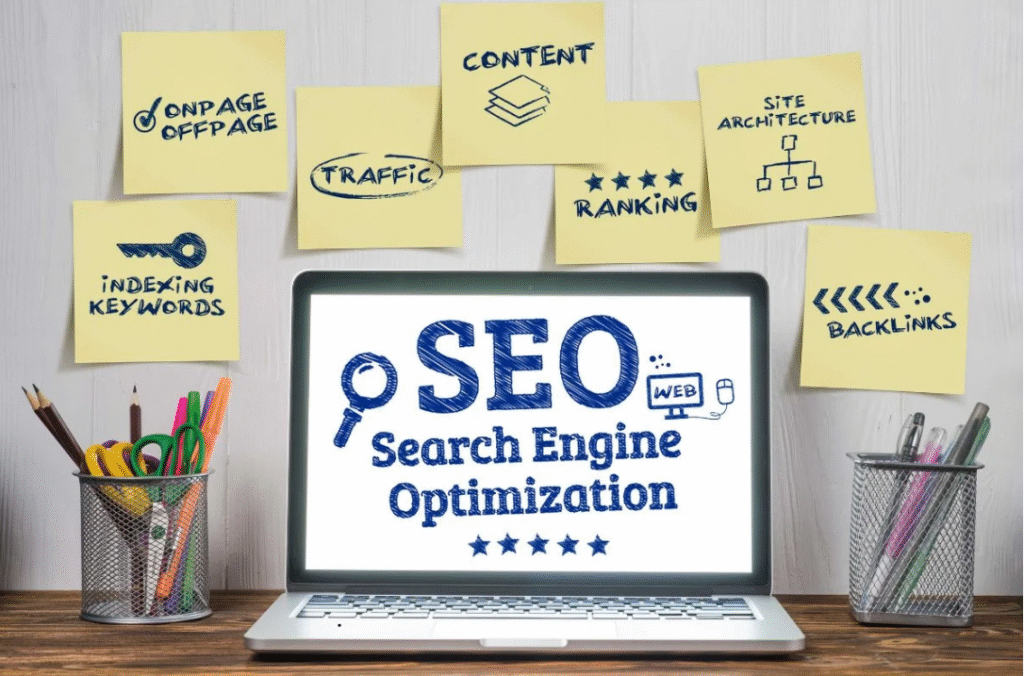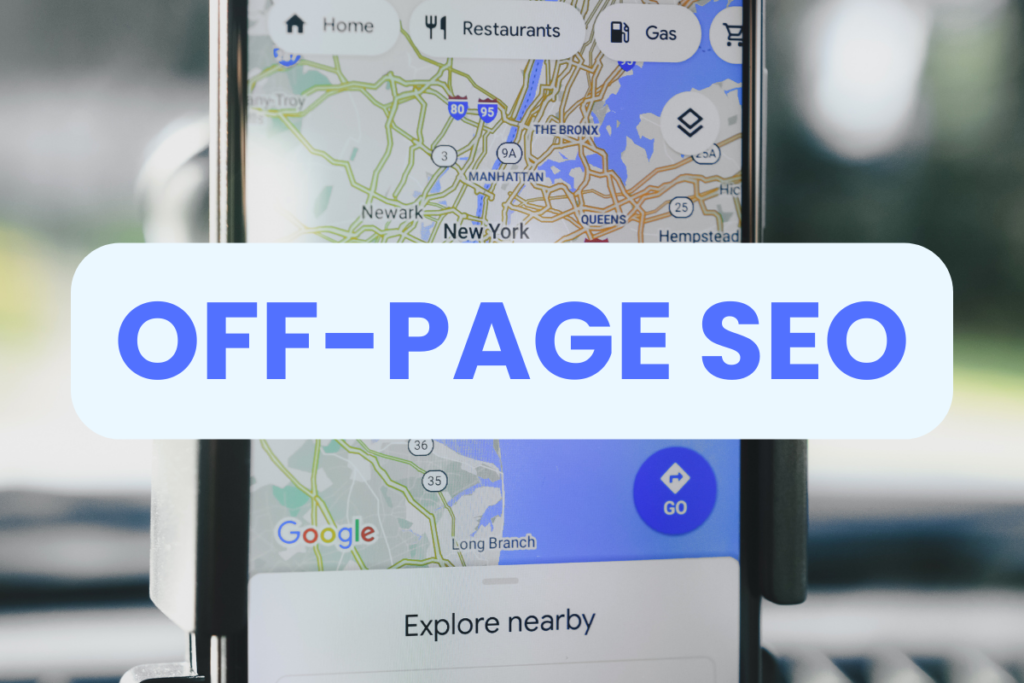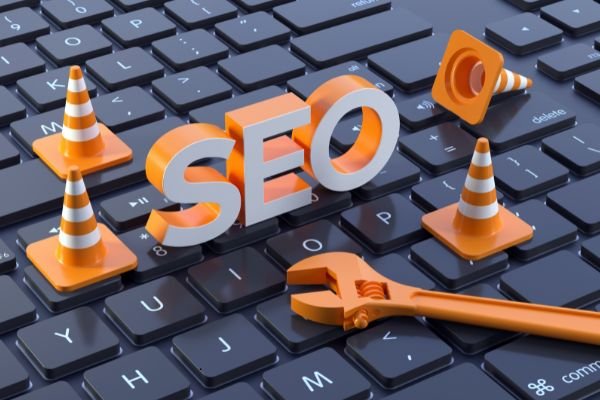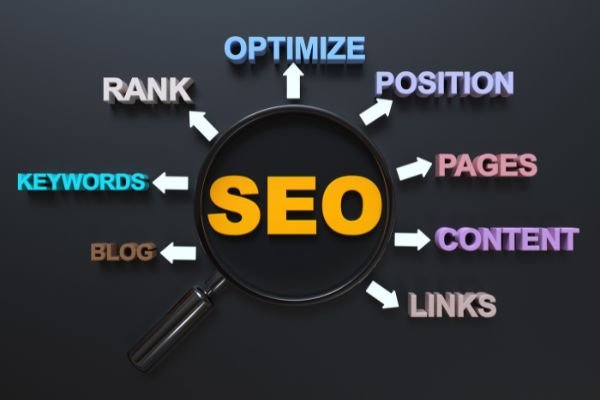On-Page Vs Off-Page SEO Vs Technical: What’s The Difference
SEO consists of three distinct types: On-Page SEO, Off-Page SEO, and Technical SEO. On-Page SEO optimizes content and HTML elements within your website, including titles, meta descriptions, and keywords. Off-Page SEO builds authority through external factors like backlinks and social signals. Technical SEO improves website infrastructure for search engine crawling, including site speed, mobile-friendliness, and security. All three types work together to improve search rankings, with each serving a specific purpose in your overall SEO strategy.

Getting Started with Search Engine Optimization
Search Engine Optimization (SEO) helps your website show up higher when people search on Google and other search engines. By using smart SEO methods, you can bring more visitors to your site without paying for ads, which means more people who want what you offer will find you. According to recent marketing research, organic search drives over 50% of all website traffic.
You need to know three main ways to improve your SEO: making your pages better, building your site’s reputation, and fixing technical issues. All three work together to help your website climb higher in search results. Eclipse Marketing specializes in implementing all three types to maximize your online visibility.
Making Your Pages: Better means working on what visitors see on your website. This includes using the right keywords, writing good titles and descriptions, and creating helpful content that answers what people are looking for.
Building Your Site’s Reputation: happens outside your website. You do this by getting other trusted websites to link to yours and by keeping a good image online.
Fixing Technical Issues: deals with the behind-the-scenes parts of your website. This means making your site load faster, work well on phones, and helping search engines understand and list your pages correctly.
Learning how to use all three methods together is key to winning at SEO. Success comes from building a website that’s easy to use, quick to load, and full of helpful information for your visitors.

Understanding On-Page SEO
On-Page SEO means making each page on your website better so it appears higher in search results and brings in more of the right visitors. It covers many different methods and parts that you can change and control yourself. Google’s Search Central documentation provides detailed guidelines on best practices for on-page optimization.
Key Parts Of On-Page SEO
Making Great Content: Your content needs to be helpful and full of useful information. Make sure everything you write is fresh, gives real value, and uses important keywords in a natural way. Break up your content with main headings and smaller headings (H1, H2, H3) to make it easy to read. Check out our blog for examples of well-optimized content.
Writing Page Titles: Page titles matter a lot to both search engines and people visiting your site. Create clear and short titles that tell exactly what the page is about, putting your most important keywords at the start. Try to keep your titles between 55 and 70 letters and spaces long. Search Engine Journal regularly publishes updates on title tag best practices.
Creating Page Summaries: Page summaries (meta descriptions) give a quick preview of what’s on your page. Write different and interesting summaries for each page, keeping them between 145 and 160 letters and spaces. Add keywords to these summaries to make more people want to click on your link.
Using Header Tags: Put header tags (H1, H2, H3) in your content to organize it like an outline, which makes it easier for people to read and helps search engines see how your information fits together.
Making Clean Web Addresses: Create simple web addresses that clearly say what the page is about and include keywords. Stay away from long web addresses and weird symbols.
Connecting Your Own Pages: Add links to other helpful pages on your own website to make it easier for visitors to find more information and to show search engines how your site is built. Use words with keywords when you create these links.
Making Images Work Better: Fix your images by giving them clear file names, adding text descriptions, and making the file sizes smaller so your pages load faster. Our web design services include image optimization as a standard feature.
Working on Phones: Make sure your website looks good and works well on phones and tablets, since many people use these devices to browse websites.
Loading Pages Faster: Quick-loading pages make visitors happy and help your search rankings. Make images smaller, use browser memory tricks, and clean up your code.
Keeping Visitors Interested: Work on making content that gets people to interact with your site, like leaving comments, sharing on social media, and staying on your pages longer.

Understanding Off-Page SEO
Off-Page SEO covers everything you do outside your website to help it rank better in search results. This powerful method helps build your online image and brings major advantages to your business. The main activities include getting other sites to link to yours, promoting on social media, and getting people to talk about your brand. Marketing research from eMarketer shows that businesses with strong off-page SEO see 3x more organic traffic.
Key Parts Of Off-Page SEO
Getting Links From Other Sites: When other websites link to yours, these are called backlinks. They matter a lot because search engines think of them as votes of trust. The more quality links you get, the more search engines believe your site is trustworthy and important. Work on getting these links from well-known websites that match what you do. Our Las Vegas SEO services include comprehensive link-building strategies.
Using Social Media To Grow: Social media work can bring visitors to your site and help more people know about your brand. When you talk with your followers on these sites, they might share your content, like your posts, and leave comments, which all help your website rank better in indirect ways. Posting regularly helps show that you know your stuff and keeps people interested.
Getting Your Name Out There: When other websites talk about your business or website without adding a link, these are brand mentions. Even without links, these mentions can still help your SEO. Search engines pay attention to these mentions and might use them to decide if your site is trustworthy and useful. Create a plan to find places where people mention you without links, then contact them to ask for a link. This will grow your online presence and make your reputation stronger.

Understanding Technical SEO
Technical SEO works on making your website easier for search engines to explore and add to their lists. It means improving how your website is built from the inside to give visitors a better experience and help search engines find you more easily. Google Search Console is an essential tool for monitoring and improving your technical SEO.
Key Parts Of Technical SEO
Making Pages Load Faster: Quick-loading pages make visitors happy and help you rank better. Programs like Google PageSpeed Insights show you what’s slowing down your site and how to fix it. Our Denver SEO agency specializes in speed optimization for local businesses.
Working Well on Phones: Your website needs to adjust to phone screens and be easy to use with fingers. Google’s Mobile-Friendly Test tells you if your site works right on phones and tablets.
Helping Search Engines Explore: Make it easy for search engines to look through your website. Use robots.txt files to show search engine robots where to go and build an XML sitemap that lists all your pages. Bing Webmaster Tools offers similar features for optimizing your site for Bing search.
Adding Security: Protect your website with HTTPS to keep visitor information safe and build trust. Google likes secure sites better, so this helps your rankings too.
Using Special Code: Add schema markup code to help search engines know what your content means. This can make your search results look better with extra details and get more people to click.
Repairing Dead Links: Look for and fix links that don’t work anymore. Bad links annoy visitors and can hurt your position in search results.
Creating Simple Web Addresses: Make web addresses that are clean and tell what the page is about. Stay away from long, messy web addresses with extra stuff that confuses people and search engines.
Avoiding Duplicate Pages: Use canonical tags to stop problems with copied content. These special tags tell search engines which version of a page is the main one.
By taking care of these technical SEO tasks, you can build a website that works great for both visitors and search engines, which leads to better results and higher positions in search.

Comparing On-Page SEO And Off-Page SEO
On-Page SEO works on fixing things inside your website. Here’s what it includes:
- Page Titles: Making interesting and useful titles for every page.
- Page Summaries: Creating clear descriptions that show up when people search.
- Section Headers: Organizing your content with the right headings.
- Great Content: Making sure what you write is helpful, fits what people want, and keeps them reading.
- Links Inside Your Site: Connecting your own pages together to help people find their way around.
By making these on-page SEO parts better, your website becomes more appealing to both search engines and the people who visit. Search Engine Land provides regular updates on on-page optimization trends.
Off-Page SEO means doing things outside your website to help it rank better. Key parts include:
- Getting Links: Earning links from other trusted websites.
- Social Media Activity: Talking with your followers on social media sites.
- Working With Leaders: Teaming up with important people in your field.
- Writing For Others: Creating articles for other websites to get more people to know you.
Adding an off-page SEO plan helps prove that your site is important and can be trusted. Our New Brunswick SEO services include comprehensive off-page strategies.

Comparing On-Page SEO And Technical SEO
On-Page SEO works on improving the parts of your website that visitors can see to help you rank better. This covers E-E-A-T content (Experience, Expertise, Authority, Trust), page descriptions, pictures, and links between your pages. The goal is to make your website useful and interesting for the people you want to reach.
Technical SEO takes care of how your website is built behind the scenes. It makes sure search engines can explore and list your pages without problems. This means working on how fast your site loads, making it work well on phones, and using safe connections (HTTPS).
Key Things That Matter
On-Page SEO:
- Making Great Content: Create helpful content that matches what people are searching for and answers their questions.
- Writing Page Tags: Use the right titles and descriptions to make more people want to click on your links.
- Fixing Your Pictures: Add text descriptions to images and make file sizes smaller so pages load quicker.
Technical SEO:
- Loading Pages Fast: Quick-loading pages keep visitors happy and help you rank higher.
- Working on All Devices: Build your site to look good and work right on computers, phones, and tablets.
- Keeping Things Safe: Use HTTPS to protect visitor information and show that your site can be trusted.
Knowing the differences between On-Page and Technical SEO helps you make your site better for both people and search engines. Be sure to work on both types to build a complete SEO plan that really works. Google Analytics can help you track the success of both strategies.
Comparing Off-Page SEO And Technical SEO
Off-Page SEO works on things you do outside your website to help it rank better in search results. These actions include getting links from other sites, being active on social media, and getting people to talk about your brand. When trusted websites link to yours, it really helps increase your website’s power and trust. Our local SEO optimization services focus heavily on building local citations and links.
Technical SEO means fixing the way your website is built from the inside. This covers jobs like making your site load faster, making sure it works great on phones, and adding HTTPS to keep it safe. Good technical SEO makes it easier for search engine robots to explore and list your pages the right way.
Looking At The Differences: Off-Page vs Technical SEO
Off-Page SEO helps you build a strong presence online and shows that people can trust you. When a popular website links to yours, it tells search engines that your site is worth visiting.
Technical SEO makes sure your website is easy to use and works properly. Having a website that loads quickly makes visitors happy, which helps your rankings go up.
When you work on your off-page SEO, you make your website look more important and trustworthy to search engines.
When you fix technical problems, you help search engine robots explore and list your website without any trouble.
Using both together is very important. If your technical SEO is weak, all your off-page work might not give you the results you want.

Using All Three Types Of SEO Together
On-Page SEO works on making your content better. Every page needs its own special title and description that uses important keywords. Use heading tags (H1, H2, H3) to organize your content and add links between your pages to help people move around your site easily.
Off-Page SEO helps you become more important online. Getting good links from other sites really matters. Write articles for other websites, stay active on social media, and work with popular people in your field to get links naturally. Consider combining this with Google Ads for immediate visibility while building organic presence.
Technical SEO takes care of how your site is built. Make sure your website loads quickly, works great on phones, and lets search engines explore it easily. Use programs like Google Search Console to find and fix listing problems and make your XML sitemap better.
Using On-Page, Off-Page, and Technical SEO together in a smart way will help more people find your website and push you higher in search results. Each type helps in its own way, but using all three will help you beat other websites trying to rank for the same things. Our SEO company in Las Vegas has proven success combining all three approaches.
Building The Best Combined SEO Plan
To create a strong SEO plan that really works, you need to bring together on-page, off-page, and technical SEO in the right way. Harvard Business Review notes that integrated digital strategies outperform siloed approaches by 40%.
On-Page SEO looks at your content and website code. Make your page titles, descriptions, and headers better by adding the right keywords. Write interesting content that gives people what they’re searching for. Add links between your pages to help visitors find more information.
Off-Page SEO works with things outside your website. Get quality links from websites that people trust. Use social media and write guest articles on other sites to help more people see your website and believe in what you offer. Contact our team to discuss custom off-page strategies for your business.
Technical SEO deals with how your website runs behind the scenes. Make sure your site works well on phones, loads fast, and uses a safe HTTPS connection. Pick a good hosting company that keeps your site running all the time.
Mixing all these methods gives you complete coverage. Keep track of how your site is doing with programs like Google Analytics and Search Console. Keep making your plan better based on what the numbers tell you.
Conclusion
Now you know the three main types of SEO and how each one helps your website succeed. On-Page SEO makes your content shine, Off-Page SEO builds your reputation, and Technical SEO keeps everything running smoothly. The real magic happens when you use all three together. Start by checking your website today, look at your page titles, test your loading speed, and see who’s linking to you. Pick one area that needs work and take action. Maybe you need better content, faster pages, or more quality backlinks. Whatever you choose, start small and keep improving. Remember, good SEO takes time, but every step you take moves your website closer to the top of search results. Don’t wait for the perfect moment, begin improving your SEO right now. Your future visitors are searching for what you offer, so make it easy for them to find you.
Frequently Asked Questions (FAQs)
Which type of SEO should I focus on first – On-Page, Off-Page, or Technical?
Start with Technical SEO to build a strong foundation. Fix any major technical problems like slow loading times or mobile issues. Then move to On-Page SEO to create great content. Save Off-Page SEO for last since it works best when your site already has quality content and runs smoothly.
How long does it take to see results from SEO efforts?
Most SEO improvements take 3 to 6 months to show results in search rankings. Technical fixes might help faster (within weeks), while building backlinks and authority through Off-Page SEO can take 6 months or longer to make a real difference.
Can I do SEO myself or do I need to hire an expert?
You can definitely start SEO yourself, especially On-Page improvements like writing better titles and content. Many Technical SEO tasks are also manageable with online tools and guides. However, complex technical issues or advanced link-building campaigns might benefit from expert help.
What’s more important – getting lots of backlinks or getting quality backlinks?
Quality beats quantity every time. One link from a trusted, relevant website is worth more than dozens of links from low-quality sites. Focus on earning links from websites that relate to your business and have good reputations.
How often should I update my SEO strategy?
Review your SEO performance monthly using tools like Google Analytics. Make small adjustments based on what’s working. Do a complete SEO audit every 6 months to catch new issues and opportunities. Stay informed about major search engine updates that might affect your strategy.

Mike has over 5 years of experience helping clients improve their business visibility on Google. He combines his love for teaching with his entrepreneurial spirit to develop innovative marketing strategies. Inspired by the big AI wave of 2023, Mike now focuses on staying updated with the latest AI tools and techniques. He is committed to using these advancements to deliver great results for his clients, keeping them ahead in the competitive online market.
